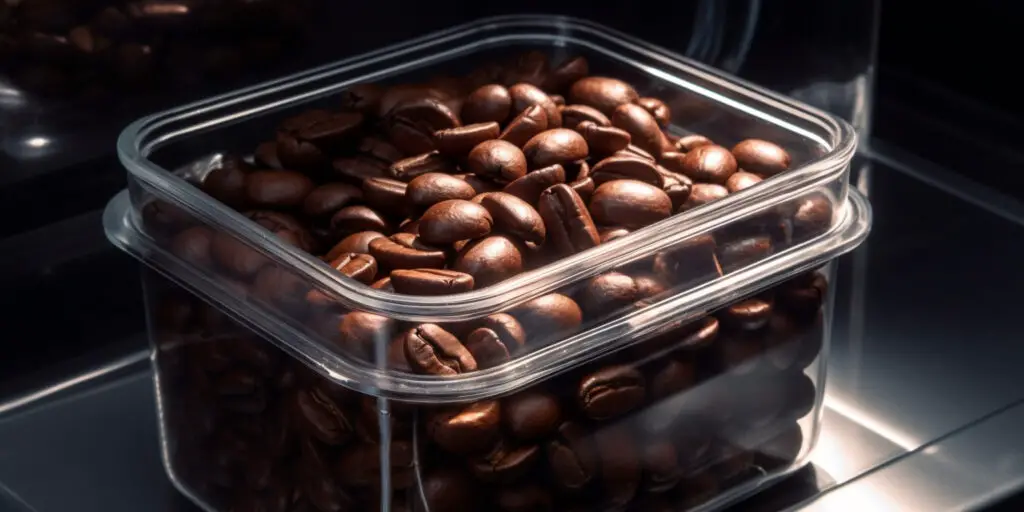When it comes to coffee beans, freshness is paramount. The conversation of preserving this freshness often leads to the question: Should you freeze coffee beans? To help you make an informed decision, we’ll delve into the logic and science behind freezing coffee beans, potential drawbacks, and the recommended practices if you choose to freeze them.
Understanding Coffee Freshness
Firstly, it’s important to understand why freshness matters when it comes to coffee. Roasting transforms green coffee beans into the aromatic brown beans we know and love. However, this process also sets a ticking clock on the beans. Once roasted, coffee beans gradually lose their flavor due to a natural process called oxidation. Exposure to air, light, heat, and moisture accelerates this process, leading to stale, flavorless coffee.
The Logic of Freezing Coffee Beans
When faced with the possibility of losing those delightful, complex flavors, the thought of freezing coffee beans seems like an appealing option. The idea here is to slow the process of oxidation. At lower temperatures, the chemical reactions that cause oxidation slow down significantly.
When you freeze food, you preserve its freshness, so it seems logical to do the same with coffee beans. You wouldn’t think twice about freezing your vegetables, so why not freeze coffee beans?
The Controversy of Freezing Coffee Beans
Despite the seemingly sound logic, the topic of freezing coffee beans is controversial among coffee enthusiasts and experts. The reason lies in the unique properties of coffee beans and the potential damage freezing might cause.
Coffee beans are porous, which means they can absorb odors from their surroundings. If stored improperly, your coffee beans might emerge from the freezer tasting like last week’s leftovers.
Secondly, freezing and thawing coffee beans can lead to moisture damage. When you remove the beans from the freezer, condensation forms on the surface. This moisture can accelerate the oxidation process once the beans return to room temperature.
The Science Behind Freezing Coffee Beans
Scientifically speaking, can you freeze coffee beans? Yes, but with caution. A 2020 study in “Scientific Reports” states that freezing coffee beans can preserve their flavor, especially for higher-quality, single-origin beans. The researchers even found that grinding frozen beans resulted in a more uniform particle size distribution, potentially leading to a more even extraction and better-tasting coffee.
Does Freezing Coffee Beans Affect the Taste?
The freezing of coffee beans can indeed impact the taste, but whether it’s a positive or negative effect largely depends on the handling and quality of the beans. If done correctly, freezing can help preserve the complex flavors of high-quality, single-origin beans. A 2020 study published in “Scientific Reports” found that grinding frozen beans can result in a more uniform particle size distribution, leading to a more consistent extraction and potentially tastier coffee.
Yet, improper freezing can result in flavor degradation. Coffee beans are porous and can absorb flavors and odors from their surroundings. If not stored in airtight containers, your beans might end up tasting like other food items stored in your freezer. Additionally, constant freezing and thawing can lead to moisture damage, accelerating the oxidation process and causing the beans to go stale faster.
Therefore, freezing coffee beans can either enhance or spoil the taste, depending on how carefully you manage the process. As with many aspects of coffee brewing, the key to success is attention to detail and careful experimentation.
Does Freezing Coffee Destroy Caffeine?
Coffee, for many people, is synonymous with caffeine. It’s the morning pick-me-up, the fuel for late-night study sessions, and the kickstart to a long day at work. Therefore, if you’re considering freezing your coffee beans, it’s valid to question whether this process might affect the caffeine content.
The short answer is no; freezing coffee beans does not destroy or reduce their caffeine content. Caffeine is a stable compound that isn’t affected by temperature changes associated with freezing. The caffeine content remains the same whether your coffee beans are frozen or stored at room temperature.
However, the extraction of that caffeine during brewing could vary based on the condition of the beans. For instance, a study published in “Scientific Reports” in 2020 found that grinding coffee beans when frozen leads to more uniform particle size. This could result in a more consistent extraction and, theoretically, maximize the amount of caffeine extracted.
It’s important to note, though, that the differences in extraction would likely be minor and not necessarily noticeable to the average coffee drinker. Many other factors, such as the type of coffee, the roast level, and the brewing method, significantly impact the caffeine content in your cup.
If you choose to freeze your coffee beans, rest assured you won’t be sacrificing your caffeine boost. Still, remember to freeze and thaw your beans correctly to preserve their flavor and quality. That way, you’ll be able to enjoy not just the caffeine but the rich and complex taste that makes coffee so beloved.
How Long Can You Freeze Coffee Beans?
Freezing coffee beans is useful for preserving their flavor, particularly if you’ve bought a large batch or infrequently brewed coffee. However, the question arises, how long can you freeze coffee beans?
As a general rule, coffee beans can be frozen for up to six months without significantly losing quality. Remember that freezing doesn’t stop the aging process completely but substantially slows it down. After six months, the beans may lose more flavor, even if they’re frozen.
Nonetheless, this doesn’t mean you should repeatedly freeze and defrost coffee beans over this period. The freezing process should ideally be a one-time event. Every time you remove the coffee beans from the freezer, they are exposed to moisture in the form of condensation, which can speed up the oxidation process and lead to a deterioration of flavor. So, to make the most of freezing, store your beans in small, airtight packages, and only remove the amount you need each time.
Keep in mind that freezing coffee beans isn’t a magic solution for everlasting freshness. The beans will still degrade over time, albeit more slowly. As with many aspects of coffee storage and brewing, your best bet is to buy only as much coffee as you can consume within a few weeks, ensuring the freshest taste. For long-term storage, freezing can be a helpful tool, but it must be done correctly to preserve the beans’ flavor.
Best Practices for Freezing Coffee Beans
If you decide to take the plunge and freeze your coffee beans, follow these best practices to ensure you maintain the beans’ quality and flavor:
- Freeze in Bulk: Ideally, you should only freeze your coffee beans once. Constantly freezing and thawing beans can lead to the problems mentioned earlier. Therefore, it’s best to freeze many coffee beans and remove just the amount you need each time.
- Use Airtight Containers: To prevent your coffee beans from absorbing unwanted flavors, store them in airtight containers before placing them in the freezer. This step also helps to prevent moisture damage.
- Don’t Rush the Thawing: When ready to use your beans, let them thaw to room temperature while still in their airtight container. This allows condensation to form on the outside of the container rather than on the beans themselves.
- Grind While Still Frozen: Grind your coffee beans while frozen. This can lead to a more consistent grind, enhancing the flavor of your coffee.
What Is the Best Method of Storing Coffee Beans?
When it comes to preserving the delightful flavors of your coffee beans, proper storage is crucial. Coffee beans, especially once roasted, are delicate and vulnerable to several elements that can spoil their taste. Light, heat, air, and moisture are the primary enemies of coffee beans. Here’s the optimal method of storing coffee beans to keep them fresh and full of flavor.
Airtight Containers
Start by storing your coffee beans in an airtight container. This method keeps the beans protected from unwanted air and moisture. The exposure to oxygen, in particular, leads to a process called oxidation, which makes coffee beans stale over time. A good airtight container made of ceramic or non-reactive metal can help to preserve the coffee’s aroma and flavor for longer.
Avoid Clear Containers
Light, especially sunlight, can degrade the quality of your coffee beans. So, avoid clear containers or storing your coffee in an area with direct exposure to sunlight. Opaque containers are best for preserving the quality of your coffee beans.
Cool, Dry Location
Coffee beans should be stored in a cool, dry place. Despite the common belief, the refrigerator isn’t ideal for your coffee beans because it exposes them to moisture and fluctuating temperatures, both of which can harm the beans. Instead, find a spot in your pantry or counter away from direct sunlight and heat sources, such as ovens or stovetops.
Buy in Small Quantities
If you want to ensure the freshest coffee, buy in small quantities that you’ll consume within a few weeks post-roasting. Freshly roasted beans will typically remain fresh for about a month. After that, they begin to lose their flavor.
Consider Freezing for Long-term Storage
If you’ve bought coffee beans in bulk or won’t consume them within a month, consider freezing them. Ensure they are sealed in an airtight container before freezing to prevent moisture damage and absorption of other flavors.
In the end, the best method of storing coffee beans largely involves protecting them from light, air, heat, and moisture. By following these guidelines, you’ll be able to enjoy your coffee’s rich, complex flavors for as long as possible.
Wrapping Up
So, can you freeze coffee beans? The answer is nuanced. For everyday coffee drinkers who consume their beans quickly, there might be other options than freezing. Simply storing your beans in a cool, dark, airtight container can keep them fresh for several weeks.
However, if you have a large quantity of high-quality, single-origin beans, freezing could be a smart way to preserve their unique flavor profile. But remember, freezing coffee beans requires careful consideration and proper handling to prevent potential quality and flavor loss.
It’s crucial to note that the art of coffee brewing is highly personal, and different approaches might work better for different people. Experiment with other methods and see if freezing coffee beans enhances your coffee experience. You might find that it’s the secret ingredient to your perfect cup of joe!

